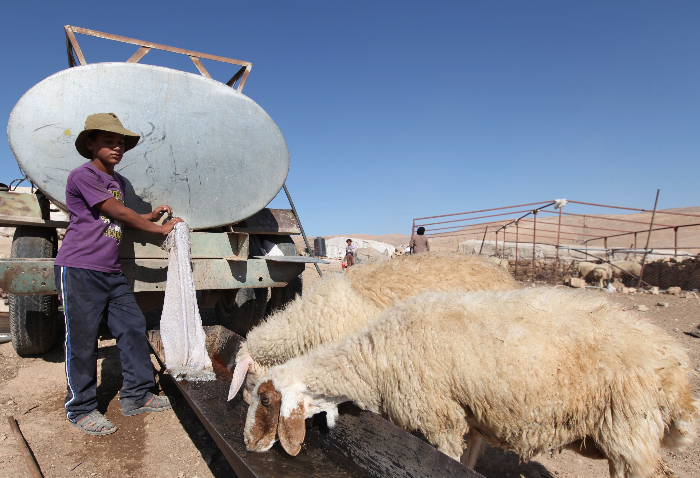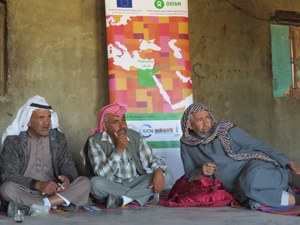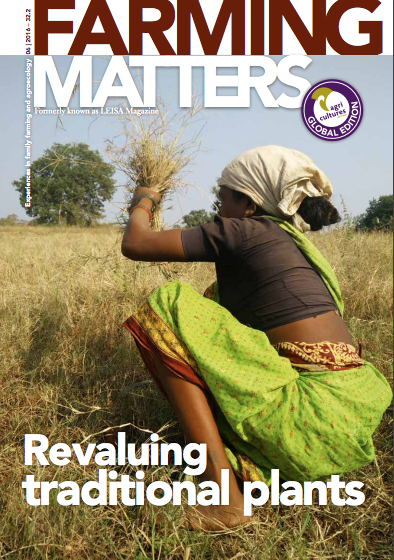In all countries of the Middle East, pastoralist communities, and Bedouins in particular, are some of the most vulnerable and disadvantaged groups in society. A new initiative, funded by the European Union, is helping to strengthen their voices through trainings on policy influencing, networking, documentation and communication for advocacy.

Bedouins and herders, like this Palestinian family in the Jordan Valley, depend on adequate access to resources, including land and water, to support their traditional livelihoods. Photo: David Levine/Oxfam
Pastoralist communities have no or limited access to critical resources such as land, water, central markets and veterinary services to sustain their traditional livelihoods. Their livelihoods are further at risk from the ever hotter, drier and less predictable weather due to strong indications of climate change in the region.
Although these groups have traditionally been able to cope with scarce natural resources, they now face intensifying threats to food security and sustainable growth in the midst of a particularly weak institutional environment. Currently, local and national institutions lack adequate policies and legislation that supports the agricultural and livestock sectors. By increasing the engagement on policy issues of pastoralist communities their voices could be heard in mainstream socio-economic life and their traditional ways of life become more sustainable.
In 2012, Oxfam, the Regional Office for West Asia (ROWA) of IUCN (International Union for Conservation of Nature) and ILEIA, joined forces with local partners in the Occupied Palestinian Territory (OPT), Jordan and Egypt to promote participation of pastoralist groups in policy decision processes that affect them.
Working together
Accessing quality services, land and water, credit and central markets are key needs and lack of organisation and advocacy knowledge are critical constraints that prevent needs from being met and pastoralists’ rights respected. Therefore, Oxfam, IUCN ROWA and ILEIA are supporting these communities to strengthen their communications, organisational and networking capacities to encourage dialogue with policy makers and other key government agencies, NGOs and private sector stakeholders.
This work is made possible through strong collaboration with local partners and institutions that are formed by practitioners and representatives from the pastoralist population. In Jordan and Egypt, the project team is working towards consolidating platforms of Bedouin and herders’ communities at the local and national levels. In the OPT, the creation of national platforms for mobile pastoralists is premature due to greater social and political fragmentation and the protracted Israeli occupation. Because of this, partners in the OPT, the Palestinian Agricultural Cooperatives Union (PACU), the Palestinian Livestock Development Centre (PLDC), and the Union for Agricultural Work Committees (UAWC), are focused on the establishment of a future national platform Their approach is two-fold: promoting the role of Palestinian partner organisations as bearers of mobile pastoralists’ interests and engaging these organisations in sub-national meetings with other stakeholders. The result will be a network of practitioners, a critical first step towards the creation of a representative platform.

The number of people benefiting from the project makes up a significant portion of the total pastoralist population across the three countries. 1500 families in the OPT, 200 in Jordan and 17,500 in Egypt are being supported to build and share knowledge, and to make their voices heard in policy making.Not only are people at the grassroots level benefiting from the project, local authorities, NGOs and government agencies are also gain from their involvement in the knowledge building and policy influencing processes. They gain a better understanding of the issues pastoralists face and the changes needed for sectorwide improvements.
Participants are learning to jointly identify common problems and needs, develop collaborative strategies for addressing challenges through policy dialogue and effectively reach out to other local, national and international partners.
In an environment of high uncertainty, improved connection and collaboration among different groups as well as the relevant authorities increases the prospect of traditional ways of life being sustained for mobile pastoralists. The project team is currently supporting local organisations (12 in the OPT, two in Jordan and one in Egypt) to implement tangible and innovative initiatives to concretely link planning to advocacy, to create more engaged communities and raise and strengthen their voices to help solve the daily problems they face.
Sharing lessons learnt
More insights and lessons learnt on food security governance of mobile pastoralist groups in the OPT, Jordan and Egypt can be expected in the coming months. ILEIA, Oxfam and the World Initiative for Sustainable Pastoralism (WISP) of IUCN will continue to share information on this initiative’s progress.
This article is part of the visibility and communications work being carried out under the framework of the Food Security Governance of Bedouin Pastoralist Groups in the Mashreq project, funded by the European Union. The contents of this publication are the sole responsibility of Oxfam, IUCN and ILEIA and can in no way be taken to reflect the views of the European Union.

